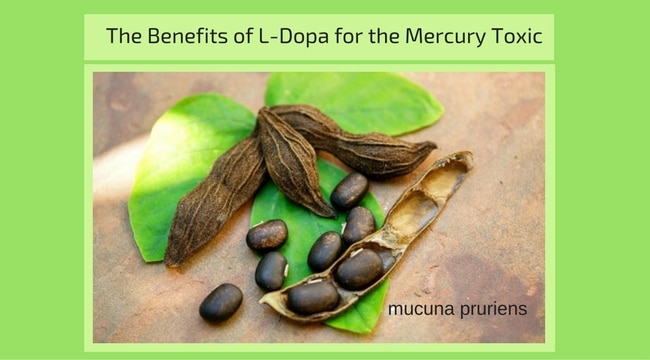Dopamine functions as a mood-enhancing neurotransmitter which is released by neurons (nerve cells) to send signals to other nerve cells. Dopamine is vital for the proper function of the central nervous system.
Mercury transforms dopamine into a toxic compound called dopaminochrome, which lowers dopamine and causes neurodeneration.This leads to the development of neurological symptoms. It can even lead to developing neurological disorders, like Parkinson’s disease, Schizophrenia and ADHD.
The lowering of dopamine concentration in brain tissue can cause depression, fatigue, the inability to handle stress, finish tasks or focus and causes mood swings, procrastination, muscle atrophy and restless legs syndrome. Dopamine also regulates motor control, sex drive, immune function, fat gain and loss, muscle gain, bone density, energy levels and the ability to sleep soundly.
L-dopa is an amino acid produced in the body derived from food sources and is a remarkable precursor for the production of dopamine and human growth hormone. Unlike dopamine, L-dopa crosses the protective blood-brain barrier, converts into dopamine and stimulates the hypothalmus and pituitary gland to produce human growth hormone.
Plant-Sourced L-Dopa
Some plants are high in L-dopa which can effectively boost dopamine production, alleviating symptoms caused by reduced dopamine. Mucuna pruriens, also known as velvet bean, is a bean that grows on trees and is particularly high in L-dopa. I often recommend my clients supplement with mucuna pruriens to boost their dopamine and human growth hormone levels. It usually offers considerable relief of their symptoms.
Another food high is L-dopa are fava beans. So, I recommend eating them regularly, drizzling them liberally with a healthy oil, such as coconut oil, raw butter or ghee and sprinkle with natural sea salt.
Nutritional Deficiencies and Leaky Gut Contribute to Low L-Dopa
Another common cause of low dopamine for the mercury toxic is nutritional deficiencies, especially in iron, magnesium and zinc. Since mercury binds to minerals, robbing them from the body’s cells, significant mineral deficiencies can be another contributing factor of low dopamine levels, as well as developing a leaky gut condition.
Mercury easily damages the intestinal mucosal layer, the ‘house’ of the immune system. Without the presence of a healthy mucosa, the immune system is compromised and the ability to properly break down food nutrients [assimilation] becomes impaired. This leads to the overgrowth of pathogens like candida, bad yeast and bacteria. These microbes eat their hosts’ food nutrients, which further contributes to nutritional deficiencies. So, an effective leaky gut protocol is essential to a successful mercury detox program.
L-tyrosine – a Precursor to L-Dopa
L-tyrosine amino acid naturally converts into L-dopa, so supplementing with L-tyrosine can also be helpful. An added bonus is that it enables the thyroid to absorb minerals more efficiently, particularly iodine and selenium. Mercury toxicity often causes a hypo-thyroid condition and I have been surprised at how effective it can be to support thyroid hormone production. Thyroid hormone gives the cells the energy they need to function optimally, so this is key.
After you’ve made more progress with your mercury detox program repairing the condition of the gut, reducing pathogens, restoring nutritional deficiencies and detoxifying the metals, low dopamine levels should not be an issue anymore. But, until then, supplementing with mucuna pruriens can be a big help to feeling better sooner rather than later.
Mercury Detox Specialist, Connie Fox HHP, NC www.FreedomFromMercuryMadness.com
___________________________
This content is for informational and educational purposes only and is not intended to diagnose, cure, treat or prevent any disease, illness or health condition. Connie Fox is not a physician and recommends discussing all health and nutrition-related matters with your physician.

